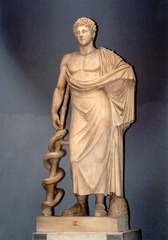Ancient Greek Medicine: From Hippocrates to Galen – Flashcards
Unlock all answers in this set
Unlock answersquestion
800 BCE - 210 AD
answer
• Transformation taking place from mystically inspired to logical reasoning and observation. • Medicine is anchored in pathology which is the study of disease - derived from Greek word of suffering. • Pathology is a system of knowledge used to draw conclusions about illness. • Moving from spiritual to empirical description of disease • Pathology at the bedside
question
Hippocrates
answer
- Created for turning people away from the super natural towards to empirical - Helped to establish medicine as an art and what we call a science, but he a philosphy - 460 BCE - 361 BCE - Hippocratic Corpus being about 50-70 essays attributed to Hippocrates cover a variety of topics including diagnosis, epidemics, paediatrics, nutrition and so forth - "Hippocratic oath" the oath doctors take before being sworn in/oath doctors swear to their patients - There are also descriptions of various diseases that may have supernatural origins - the "sacred" disease now known as epilepsy - Need to focus on concept of having a natural cause - Observation rather than theory - Nature itself has strong healing forces and the role of the physician is to observe the patient and tap into the healing forces to help the patient overcome his/her illness- Physician must help restore balance - Health can be effected by environment, religion, social circumstances
question
4 Humours
answer
To explain the life functions Greeks embraced the values of four humours 1. black bile (earth) 2. yellow bile (fire) 3. phlegm (water) 4. blood (air) - These are not fictitious, not mere principles, but very real. Wound the body anywhere and you will see blood. Give a drug that acts on phlegm and the individual will vomit phlegm; or [yellow] bile if you give him a cholagogic remedy. Similarly, he will evacuate black bile in response to certain drugs - Each humour was distinct but phlegm, black bile, and yellow bile can all be found in blood. Blood considered hot and wet it was the essence of vitality and sustaining life.
question
Blood
answer
Each humour was distinct but phlegm, black bile, and yellow bile can all be found in blood. Blood considered hot and wet it was the essence of vitality and sustaining life.
question
Phlegm
answer
- cold and wet, tended to encompass most liquid in the body (mucus, saliva, plasma) believed that these fluid in the body cooled the body. Kept the organism moist and lubricated all interior parts - Phlegm was believed to have an expulsive virtue—eliminating waste and impurities from the body. Sensitive, Passive
question
Yellow Bile
answer
- associated with fire is hot and dry. Believed to be produced by the liver and stored in the gall bladder. Yellow bile turns poop brown-- has a digestive virtue to digest and metabolize. Courage, Bolden, jealous, envious
question
Black Bile
answer
- associated with earth cold and dry. Thought as having the sediment in blood to help thicken and clot. Vitally important to the formation of scabbing and scars. It was believed to have a retentive virtue which was cooling, drying, coagulating. Melancholy - Epilepsy having too much phlegm in brain? - Still believed the physiology was more important that the anatomy
question
Ancient Greek sculpture
answer
- Herb supplements - Strong diet - Non-drug elements - Blood letting was a popular form of ... - Plethora = too much blood in the body
question
Asclepius

answer
- Makes appearance in the Iliad. Healer with great skills that was deified - 3 daughters: Hygea (hygiene), Acheso (healing process), Panacea (the ultimate answer) - Asclepian staff/rod
question
Alexander the Great
answer
360 BCE - 326 BCE - Shows Hellenistic world began expanding outwards - Alexandria (renamed city in Egypt) - Plus 700 other documents of science, suggest the filed was flourishing during this time - 4th century there is a real investment in science in Alexandria - dissection was allowed for a brief period. It was actively encouraged. The practice was reserved solely for criminals. - Practice of dissection taught Alexandrian doctors structure and function (300 BC) specifically with 2 characters
question
Herophilus
answer
- Eagerly exploited dissection - Author of several medical treaties - Special interest in arteries and their pulsation - Able to distinguish between arteries (pump blood from heart, veins pump blood back to heart) - Interested in nervous system and was able to determine that the nerves in the body have a specific relation to the brain and the nerves transmitted some sort of nerve impulse to the brain and vice versa
question
Erasistratus
answer
- Background with medical history - Devoted to both anatomy + physiology - Credited +50 essays on human body (incl. specialized texts on fevers, poisons and blood letting) - Also skeptical about Humoraj theory - Arteries and nerves were hollow tubes that carried a "vital" spirit (pneuma = Greek word meaning breath) to the muscles which is allowing the body to move - Only veins can bring to body and believed that too much blood in the body caused disease - Very much in favour of blood letting
question
Galen
answer
- Distinguished himself from predecessors - Left the most writings about all the issues of the day (political, scientific,etc) - Rival to Alexandria - Ancient Greek medicine known to the world because of Galen - Became chief physician to group of gladiators and in this role he is able to explore the human body in more detail - No dissection during Galen's time - While in Rome appointed physician of Regalinus - Dissected animals - accepted 4 humours theory, preaches balance of them for optimal health - promoted ideas of "Life Force", believed it sustained life in things - rested on Plato's theory of the Tri-part soul (brain, liver, heart)
question
Nature Philosopher
answer
Now known as a scientist - 3 branches logic, physics, ethics all crucial to understand and practice medicine
question
Galen's Theory
answer
Food ; Liver, Liver ; Blood (natural spirit), Blood ; Lung (air-- the vital spirit; "pneuma"), Lung > arteries; veins, Arteries; veins > Brian (animal spirit) - Believe this is how blood originates and moves in the body - Missing heart, was an organ in the body that acts as an irrigation ditch... didn't see a real purpose - Refused that the heart served purposes of blood flow
question
Galen to Gaenism (Legacy)
answer
- Honored as the authoritarian voice of medicine - Wasn't challenged until 16th century - Boastful, not a modest person - Once Galen discovered it all, essentially there was nothing else to discover



